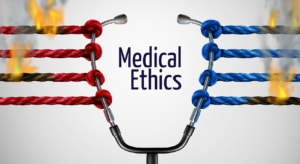This is the case of an important ethical dilemma, especially as modern-day medicine clearly has the ability to do something about it. Let’s visit this medical ethics question.
 Anthony Dickerson Jr. is a two-year old toddler. He is perfect, and perfectly beautiful except for one problem. He has a rare condition in that he was born without either kidney. We cannot live long without kidneys or without routine medical intervention. Sadly, last month Anthony Dickerson Jr. reportedly suffered a stroke and he must now be continuously monitored.
Anthony Dickerson Jr. is a two-year old toddler. He is perfect, and perfectly beautiful except for one problem. He has a rare condition in that he was born without either kidney. We cannot live long without kidneys or without routine medical intervention. Sadly, last month Anthony Dickerson Jr. reportedly suffered a stroke and he must now be continuously monitored.
The situation is maddening, as his father is the perfect match and his father is perfectly willing to give his kidney to his son, so it should be a simple and straightforward procedure. However, there is a wrinkle. Anthony Dickerson Sr. is behind bars.
Medical Ethics: Choices and Consequences
In 2011, Anthony Dickerson Sr. was arrested for theft and forgery, then in September 2017 he was arrested again for violating probation. He made the choice to be in the possession of a firearm. It was a necessary consequence for making an incredibly stupid choice. While in jail, he wanted to at least attempt to make some amends by asking the courts to allow him to proceed with the operation. He wanted nothing for himself, only to help his little boy. This seems like a medical ethics no brainer.
He talked to the hospital, and the hospital wrote to the courts on his behalf requesting he be allowed to go to Emory Hospital for blood work and testing to allow the operation to proceed. The blood work and pre-operation testing was completed. At that point, Dickerson had been released and was back on probation.
It came as a complete surprise when the toddler’s mother received a follow-up letter from the hospital that informed her the surgery would be delayed until Dickerson had complied with his parole officer following three months of additional probation. The hospital said they would re-evaluate the situation in January 2018 after they received all of the documentation that said Dickerson had completed his three months.
According to the hospital spokesperson:
“Guidelines for organ transplantation are designed to maximize the chance of success for organ recipients and minimize risk for living donors. Because of privacy regulations and respect for patient confidentiality, we cannot share specific information about our patients.”
Who is Being Punished?
The hospital guidelines are written as bureaucratic necessities, and they are, I am sure, for the most part understandable. Medical professionals strive to reduce risk. As a patient I too would desire the least possible risk with any procedure.
However, this situation involving Anthony Dickerson Sr. and his two-year old son is the reverse situation. Presumably, the longer the hospital waits the more serious the little boy’s situation might become. If the hospital wants to reduce risk, why not perform the surgery sooner rather than later? Could it be that other factors are in play?
Dickerson, a felon, was rearrested following the discovery of a gun in his possession. No one can deny it was a stupid, unnecessary consequence. What he was doing with the weapon – or why he felt the need to carry it, is a matter for the criminal justice system. That, in part, is the point. The hospital is playing an intermediary role it should not be playing. The hospital is neither judge nor jury. The hospital should be more interested in healing a patient. To me that’s what logical medical ethics would dictate.
If the parole officer is saying that it is fine with the father to donate a kidney to his son, why is the hospital denying procedure? Perhaps there is righteous indignation that the father should be penalized for his mistake. I understand such attitudes but the father is ultimately not the one who will possibly suffer with a delay, it is the toddler.
I might add that donating a kidney is not the same thing as winning an all-expense paid vacation to Cozumel. The procedure is not without its pain and as with any surgery, it is not without its risks. The father will be laid up in bed, and he will have to learn how to care for himself with having one kidney. He will not be partying.
The hospital has taken the position of visiting the sins of the father on the son. It is a risky decision medically, and more seriously, in an ethical sense. The father paid for his crimes. Why should the son pay for those crimes as well?
-YOUR COMMENTS ARE WELCOME!


